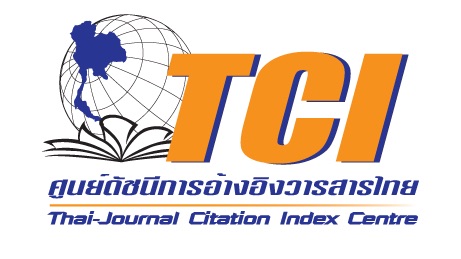A Pragmatic Study of Politeness Strategies of Facebook Page Admins of Thai Commercial Banks
Keywords:
Politeness Strategies, Pragmatics, Commercial BankAbstract
This research aims to study the politeness replying strategies to customer’s idea from the admins of Thai commercial Banks’s Facebook page, by pragmatics. Data were collected from seven Facebook pages of six commercial banks in Thailand. The results based on the Politeness Strategy of Brown and Levinson show that politeness strategies of the Facebook page admins were divided into three aspects as 1) notice, 2) request and 3) rejection. The most politeness strategies used were praise and apology. Factors affecting to choose the politeness strategies’ choice of admin were social distance and power between the admins and the bank customers in business relationships.
References
ดียู ศรีนราวัฒน์. (2544). กลวิธีการสื่อสารด้วยการพูดอ้อมของคนไทย. วารสารศิลปศาสตร์, 1(2), 85-101.
ทรงธรรม อินทจักร. (2549). เอกสารประกอบการสอนวิชาวัจนปฏิบัติศาสตร์. ภาควิชาภาษาศาสตร์ คณะศิลปะศาสตร์ มหาวิทยาลัยธรรมศาสตร์.
ปนันดา เลอเลิศยุติธรรม. (2549). การศึกษาความสุภาพในการขอร้องและการปฏิเสธในการติดต่อธุรกิจทางจดหมายในภาษาไทยตามแนววัจนปฏิบัติศาสตร์ [วิทยานิพนธ์ปริญญาดุษฎีบัณฑิต สาขาภาษาศาสตร์ คณะอักษรศาสตร์]. จุฬาลงกรณ์มหาวิทยาลัย.
เยาวลักษณ์ กระแสร์สินธุ์. (2529). กลวิธีการทำภาษาให้สุภาพในภาษาไทย [วิทยานิพนธ์ปริญญามหาบัณฑิต สาขาภาษาศาสตร์ บัณฑิตวิทยาลัย]. มหาวิทยาลัยมหิดล.
วิไลวรรณ ขนิษฐานันท์. (2529). ความสุภาพในภาษาไทยกรุงเทพฯ. สำนักพิมพ์แห่งจุฬาลงกรณ์มหาวิทยาลัย.
ศิรวัตร ไทยแท้ และปนันดา เลอเลิศยุติธรรม. (2554). กลวิธีความสุภาพในการปฏิเสธการขอร้องของผู้โดยสารจากมุมมองวัจนปฏิบัติศาสตร์. วารสารมนุษยศาสตร์, 18(2), 141-156.
สุจริตลักษณ์ ดีผดุง. (2549). วัจนปฏิบัติศาสตร์เบื้องต้น. สามลดา.
สำนักงานพัฒนาธุรกรรมทางอิเล็กทรอนิกส์ (องค์การมหาชน)กระทรวงดิจิทัลเพื่อเศรษฐกิจและสังคม. (2560). รายงานผลสำรวจพฤติกรรมผู้ใช้อินเทอร์เน็ตในประเทศไทยปี 2560. https://techno.coj.go.th/th/content/category/detail/id/1874/cid/1876/iid/15442
Brown, P., & Stephen, C. L. (1978). Universals in Language Usage: Politeness Phenomena. E. N. Goody (ed.). Questions and Politeness: Strategies in Social Interaction. Cambridge: Cambridge University Press.
Brown, P., & Stephen, C. L. (1987). Politeness: Some Universals in Language Usage. Cambridge: Cambridge University Press.
Gu, Y. (1990). Politeness phenomena in Modern Chinese. Journal of Pragmatics, 14(2), 237-257. https://doi.org/10.1016/0378-2166(90)90082-O
Lakoff, R. T. (1989). The Way We Are; or, the Real Actual Truth about Generative Semantics: A Memoir. Journal of Pragmatics, 13(6), 939-988. https://doi.org/10.1016/0378-2166(89)90016-7
Leech, G, N. (1983). Principles of Pragmatics. Longman.
Yu, M. C. (2003). On the Universality of Face: Evidence from Chinese Compliment Response Behavior. Journal of Pragmatics, 35(10-11), 1679-1710. https://doi.org/10.1016/S0378-2166(03)00074-2
Downloads
Published
How to Cite
Issue
Section
License

This work is licensed under a Creative Commons Attribution-NonCommercial-NoDerivatives 4.0 International License.







